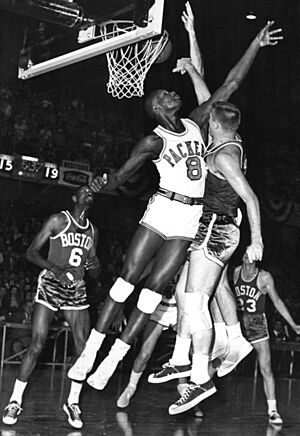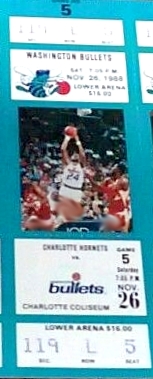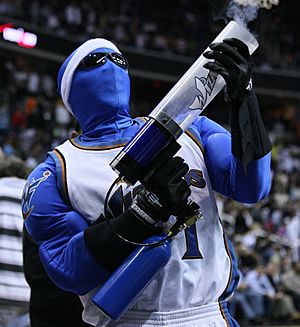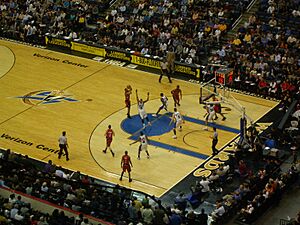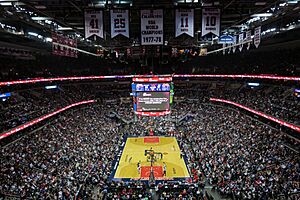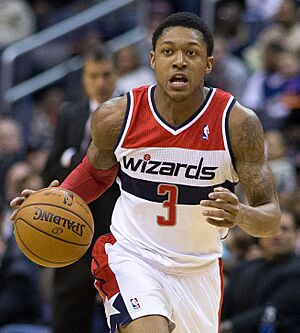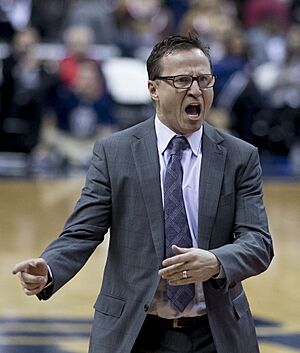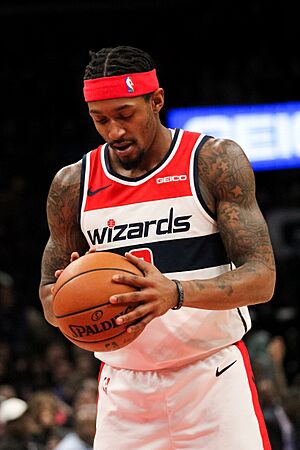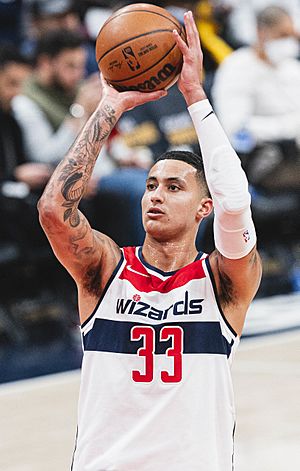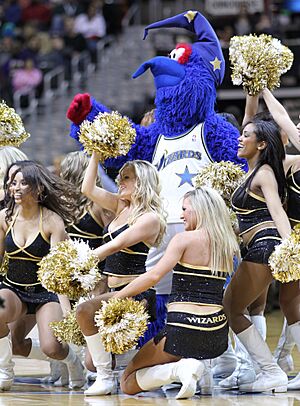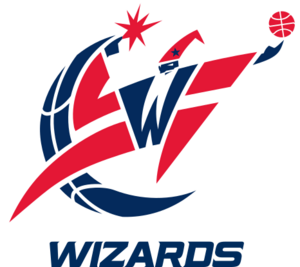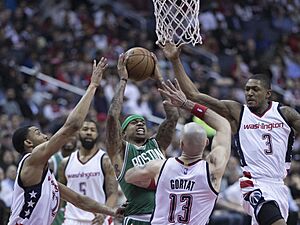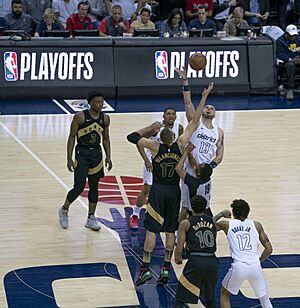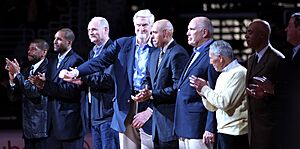Washington Wizards facts for kids
The Washington Wizards are a professional basketball team from Washington, D.C. They play in the National Basketball Association (NBA) as part of the Eastern Conference. Their home games are at Capital One Arena in Washington, D.C. The team is owned by Ted Leonsis through Monumental Sports & Entertainment.
The team started in 1961 as the Chicago Packers in Chicago, Illinois. The next year, they changed their name to the Chicago Zephyrs. In 1963, they moved to Baltimore, Maryland, and became the Baltimore Bullets. In 1973, the team moved to the Washington metropolitan area and first changed its name to the Capital Bullets, then the next season to Washington Bullets. In 1997, they changed their name again to the Wizards.
The Wizards have played in four NBA Finals and won one championship in 1978. They have made it to the playoffs 28 times, won four conference titles, and eight division titles. Their best season was in 1975, with 60 wins and 22 losses. Wes Unseld is the only player in the team's history to win both the NBA MVP award (in 1969) and the Finals MVP award (in 1978).
Quick facts for kids Washington Wizards |
|||
|---|---|---|---|
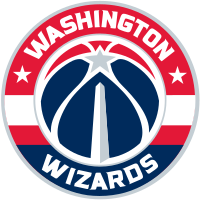 |
|||
| Conference | Eastern | ||
| Division | Southeast | ||
| Founded | 1961 | ||
| History | Chicago Packers 1961–1962 Chicago Zephyrs 1962–1963 Baltimore Bullets 1963–1973 Capital Bullets 1973–1974 Washington Bullets 1974–1997 Washington Wizards 1997–present |
||
| Arena | Capital One Arena | ||
| Location | Washington, D.C. | ||
| Team colors | Navy blue, red, silver, white |
||
| Main sponsor | Robinhood | ||
| President | Michael Winger | ||
| General manager | Will Dawkins | ||
| Head coach | Brian Keefe | ||
| Ownership | Monumental Sports & Entertainment (Ted Leonsis) | ||
| Affiliation(s) | Capital City Go-Go | ||
| Championships | 1 (1978) | ||
| Conference titles | 4 (1971, 1975, 1978, 1979) | ||
| Division titles | 8 (1969, 1971, 1972, 1973, 1974, 1975, 1979, 2017) | ||
| Retired numbers | 5 (10, 11, 25, 41, 45) | ||
|
|||
Contents
- History of the Wizards Team
- How the Team Started
- The Wes Unseld Era (1967–1981)
- Playoff Challenges (1979–1988)
- End of the Bullets Name (1989–1997)
- Rebranded as the Wizards (1997–2001)
- The Michael Jordan Era (2001–2003)
- The Gilbert Arenas Era (2003–2010)
- The John Wall Era (2010–2019)
- New Ownership and John Wall's Arrival (2010–2013)
- Arrival of Bradley Beal (2012–2013)
- Return to Playoffs (2013–2014)
- Another Playoff Run (2014–2015)
- Missing Playoffs and Coaching Change (2015–2016)
- Winning the Division (2016–2017)
- More Playoff Appearances (2017–2018)
- Injuries and Rebuilding (2018–2019)
- The Bradley Beal Era (2019–2023)
- Rebuilding the Team (2023–Present)
- Season Records
- Team Name, Logos, and Uniforms
- Home Arenas
- Team Personnel
- Team Records and Awards
- See also
History of the Wizards Team
How the Team Started
The Wizards started as the Chicago Packers in 1961. They were the NBA's first new team added to the league. Their star player was rookie Walt Bellamy, who scored a lot of points and grabbed many rebounds. He was named Rookie of the Year, but the team had the worst record that season.
The team's first name, "Packers," was not very popular. After just one year, they changed their name to the Chicago Zephyrs. In 1963, the team moved to Baltimore, Maryland, and became the Baltimore Bullets. They played their home games at the Baltimore Civic Center.
In 1964, the Bullets made a big trade that helped them reach the playoffs for the first time. They surprised many by winning their first playoff series. However, they lost in the next round.
The Wes Unseld Era (1967–1981)
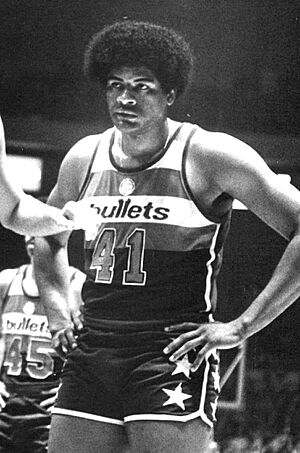
In the late 1960s, the Bullets drafted two amazing players: Earl Monroe and Wes Unseld. The team got much better, winning 57 games in the 1968–69 season. Unseld won both Rookie of the Year and MVP awards that year! Even with high hopes, they lost in the playoffs to the New York Knicks.
In the 1970–71 season, the Bullets finally beat the Knicks in the Eastern Conference finals. This sent them to their first NBA Finals. However, they were swept (lost all four games) by the strong Milwaukee Bucks team, led by Kareem Abdul-Jabbar and Oscar Robertson.
Even after some key players left, the Bullets remained a strong team in the 1970s. In 1972, they got Elvin Hayes and drafted Kevin Porter. In February 1973, the team announced they would move to Landover, Maryland, a suburb of Washington, D.C. They became the Capital Bullets for one season, then changed their name to the Washington Bullets.
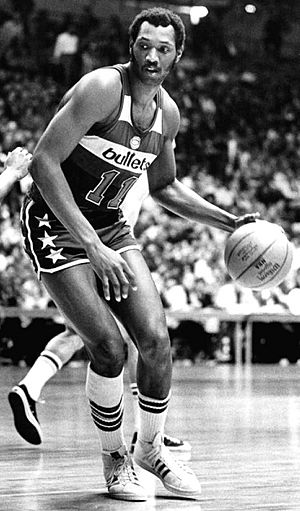
The Bullets had a fantastic season in 1975, winning 60 games. They made it back to the NBA Finals, but surprisingly lost to the Golden State Warriors in four games. This loss affected them the next season, and their coach was fired.
Under new coach Dick Motta, the Bullets continued to be a playoff team.
Winning the NBA Championship (1977–1978)
Even though they had great players like Elvin Hayes and Wes Unseld, the Bullets had an average season in 1977–78. Many people didn't expect them to win the NBA Finals. But they surprised everyone, defeating the Seattle SuperSonics in seven exciting games. This brought a major sports championship to Washington, D.C., for the first time in 36 years! It is still the only NBA title the team has won.
Back to the Finals (1978–1979)
In the 1978–79 season, the Bullets moved to a new division and won it. They had a strong season and made it to the 1979 NBA playoffs. They had some tough series, including coming back from being down 3–1 against the San Antonio Spurs to win in seven games. This led them to the NBA Finals again, for a rematch with the Seattle SuperSonics.
The Bullets won Game 1 of the Finals, but then lost the next four games, losing the series to Seattle. The Bullets were the only team to play in the NBA Finals four times during the 1970s.
Playoff Challenges (1979–1988)
In August 1979, the Bullets were the first NBA team to visit China, playing exhibition games there.
As their star players got older and faced injuries, the Bullets started to struggle. In the 1979–80 season, they barely made the playoffs and were swept in the first round. The next year, they missed the playoffs for the first time in 13 years. Wes Unseld retired, and Elvin Hayes was traded.
In the early 1980s, the team had some winning seasons but often lost in the first round of the playoffs. In 1985, the Bullets drafted Manute Bol, who was amazing at blocking shots. He blocked 397 shots that year, a team record! The Bullets also got Moses Malone in 1986, which helped them have another winning season. However, they still lost in the playoffs.
In 1987, the Bullets drafted Muggsy Bogues, who is the shortest player in NBA history. The team struggled early in the season, and coach Kevin Loughery was replaced by former MVP Wes Unseld. Under Unseld, the team improved and made the playoffs again, but lost in five games. It would be nine seasons before they returned to the playoffs.
End of the Bullets Name (1989–1997)
The Bullets had a tough period in the late 1980s and early 1990s, often finishing with losing records. Despite good individual performances from players like Bernard King and Jeff Malone, the team couldn't consistently win. In 1990, Susan O'Malley became the first female president of an NBA team for the Bullets.
Injuries continued to hurt the team. Even with talented players like Pervis Ellison and Tom Gugliotta, they struggled. In 1994, they drafted Juwan Howard and traded for Chris Webber. Webber showed great potential, but injuries kept him off the court for many games, leading to more losing seasons.
Despite the challenges, the team started to improve in the 1996–97 season. With players like Webber, Howard, Rod Strickland, and Gheorghe Mureșan (the tallest player in the league at 7 feet 7 inches), they finished with a winning record and made the playoffs for the first time in nine years! They lost to the Chicago Bulls in the first round, but the games were close.
Becoming the Wizards
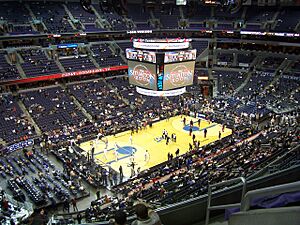
In November 1995, owner Abe Pollin announced he was changing the team's name. He felt the name "Bullets" had become too linked with violence, especially with high crime rates in Washington, D.C., at the time. A contest was held to pick a new name, and on May 15, 1997, the Bullets officially became the Wizards.
Along with the new name, the team got a new logo and changed its colors from red, white, and blue to blue, black, and bronze. That same year, the Wizards moved to a new arena, the MCI Center (now Capital One Arena).
Rebranded as the Wizards (1997–2001)
The newly named Wizards started the 1997–98 season in their new arena. They finished with a good record but just missed the playoffs. Chris Webber and Rod Strickland were key players. However, Webber was traded in 1998.
The team continued to struggle for the next few seasons, finishing with losing records. In the 2000–01 season, they had their most losses ever in one season.
The Michael Jordan Era (2001–2003)
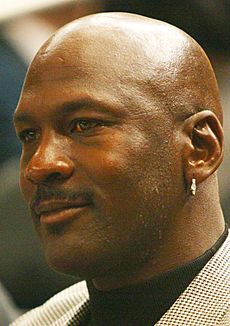
In January 2000, basketball legend Michael Jordan became a part-owner and executive for the Washington Wizards. In September 2001, Jordan, at 38 years old, decided to come out of retirement to play for the Wizards. He said he was returning "for the love of the game."
2001–2002 Season
Before the All-Star break, Jordan was playing very well, leading the Wizards to a winning record. However, his knee couldn't handle the demands of a full season, and he ended up on the injured list. The Wizards finished the season with a losing record and missed the playoffs.
2002–2003 Season
Jordan returned for the 2002–03 season. He tried to help the team by bringing in new players like Jerry Stackhouse and Larry Hughes. Despite his efforts and playing in all 82 games, the Wizards again finished with a losing record. Jordan retired from playing basketball for the third and final time after this season.
After the season, the team owner, Abe Pollin, fired Jordan from his role as team president. Jordan felt surprised, as he thought he would get his ownership back.
The Gilbert Arenas Era (2003–2010)
Arrival of Gilbert Arenas (2003–2004)
Without Michael Jordan, the Wizards were not expected to win much, and they didn't. However, they signed future All-Star point guard Gilbert Arenas, which was a big move for the team. They finished the season with a 25–57 record.
Return to the Playoffs (2004–2005)
The team made some important trades, bringing in Antawn Jamison. With Arenas, Jamison, and Larry Hughes, the Wizards had a powerful scoring trio known as "The Big Three." Hughes led the NBA in steals. Arenas and Jamison were both chosen for the All-Star team, the first time the Wizards had two All-Stars since 1987.
The 2004–05 season was their best in 26 years, and they made the playoffs as the Wizards for the first time ever! Fans were very excited. They won their first playoff series since 1988, coming back from being down 0–2 against the Chicago Bulls. This was a huge achievement for the team. In the next round, they were swept by the Miami Heat.
Continued Playoff Appearances (2005–2007)
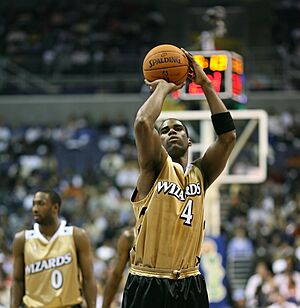
The 2005–06 season saw the Wizards add Caron Butler and Antonio Daniels. With Arenas, Jamison, and Butler, they again had a strong "Big Three." They made the playoffs for the second year in a row, which hadn't happened since 1987. They had a very close series against the Cleveland Cavaliers, losing in six games, with several games decided in overtime.
The 2006–07 season started well. Arenas scored a franchise-record 60 points in one game. However, injuries hit the team hard late in the season, with both Butler and Arenas suffering season-ending knee injuries. Despite this, the Wizards still made the playoffs but were swept by the Cleveland Cavaliers.
Injuries and Struggles (2007–2010)
The 2007–08 season was again affected by injuries, especially to Gilbert Arenas, who missed most of the season. Caron Butler also missed many games. Despite these challenges, the Wizards still managed to make the playoffs but lost to the Cleveland Cavaliers in six games.
The next two seasons were very difficult. Arenas signed a big contract but continued to deal with knee issues. Other key players also faced injuries. The team struggled, and coach Eddie Jordan was fired. The Wizards finished with one of their worst records ever.
In November 2009, owner Abe Pollin passed away. Control of the team went to his widow, Irene. In December 2009, Gilbert Arenas faced issues related to team rules, which led to his suspension.
The team made several trades in February 2010, sending away key players like Caron Butler, Brendan Haywood, and Antawn Jamison. The Wizards finished the season with a poor record and missed the playoffs.
The John Wall Era (2010–2019)
New Ownership and John Wall's Arrival (2010–2013)
Monumental Sports & Entertainment owner Ted Leonsis took over the Wizards in June 2010. He wanted to connect more with fans and decided to change the team's colors back to the traditional red, white, and blue, similar to the Bullets era. The team also got new uniforms that looked like the ones from 1974 to 1987.
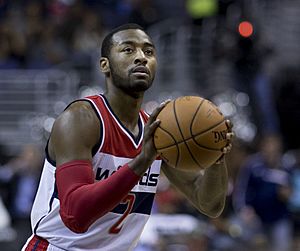
In the 2010 NBA draft, the Wizards won the lottery and picked John Wall as the first overall pick. Wall was a very exciting point guard. The team also traded Gilbert Arenas to the Orlando Magic in December 2010. The Wizards continued to have losing seasons for a few years.
Arrival of Bradley Beal (2012–2013)
In the 2012 NBA draft, the Wizards selected Bradley Beal, another talented young player. On April 30, 2013, Jason Collins, who played for the team briefly, made history by announcing he was gay. The Wizards finished the season with a 33–49 record.
In the 2013 NBA Draft, the Wizards picked Otto Porter from Georgetown University. They also traded for center Marcin Gortat.
Return to Playoffs (2013–2014)
On April 2, 2014, the Wizards secured a playoff spot for the first time since the 2007–08 season. Led by first-time All-Star John Wall, they defeated the Chicago Bulls in the first round, winning their first playoff series since 2005. They then faced the Indiana Pacers in the conference semifinals, losing in six games.
Another Playoff Run (2014–2015)
After Trevor Ariza left, the Wizards signed veteran player Paul Pierce. Pierce's experience helped the team a lot. The Wizards had their best record since the 1978–79 season, finishing with 46 wins. They swept the Toronto Raptors in the first round of the playoffs, which was the team's first-ever playoff sweep! In the next round, they played the Atlanta Hawks. John Wall got injured, and even though Paul Pierce made some big shots, the Wizards lost the series in six games.
Missing Playoffs and Coaching Change (2015–2016)
The 2015–16 season was not as successful, and the Wizards missed the playoffs. Head coach Randy Wittman was fired. In April 2016, Scott Brooks, a former coach for the Oklahoma City Thunder, became the new head coach.
Winning the Division (2016–2017)
The 2016–17 season was one of the best in recent Wizards history. They won 49 games and won the Southeast Division title for the first time since 1979! This was thanks to the great play of Bradley Beal, who had a career-high in points, and John Wall, who also had career highs in points and assists.
In the playoffs, they beat the Atlanta Hawks in the first round. In the second round, they faced the top-seeded Boston Celtics and lost in seven games.
More Playoff Appearances (2017–2018)
For the 2017–18 season, the Wizards played in the newly named Capital One Arena. They finished with a 43–39 record and made the playoffs as the 8th seed. They lost in six games to the Toronto Raptors. Bradley Beal made his first All-Star team this season, along with John Wall.
Injuries and Rebuilding (2018–2019)
The 2018–19 season was tough due to many injuries, especially to John Wall, who had a season-ending Achilles injury. The team also made several trades. As a result, the Wizards missed the playoffs. Bradley Beal made his second All-Star Team.
In April 2019, general manager Ernie Grunfeld was fired, and Tommy Sheppard took over. The Wizards drafted Japanese player Rui Hachimura in the 2019 NBA draft. The team played in the "NBA Bubble" in 2020 due to the pandemic but missed the playoffs.
The Bradley Beal Era (2019–2023)
In December 2020, the Wizards traded John Wall to the Houston Rockets for Russell Westbrook. Bradley Beal had a fantastic season, making the All-NBA Third Team. Russell Westbrook achieved a "triple-double" average for the fourth time in his career (meaning he averaged double digits in points, rebounds, and assists).
The Wizards returned to the playoffs this season but were defeated by the Philadelphia 76ers in five games. In June 2021, coach Scott Brooks and the Wizards decided to part ways.
In August 2021, the Wizards traded Russell Westbrook to the Los Angeles Lakers for Kyle Kuzma, Kentavious Caldwell-Pope, and Montrezl Harrell. The team started the 2021–22 season well but then struggled, partly due to a wrist injury that sidelined Bradley Beal for the rest of the season.
At the trade deadline, the Wizards acquired All-Star Kristaps Porziņģis. The team finished with a 35–47 record for two seasons in a row and missed the playoffs. In April 2023, general manager Tommy Sheppard was fired.
Rebuilding the Team (2023–Present)
During the 2023–24 off-season, the Wizards began to rebuild their team. They traded their star player Bradley Beal to the Phoenix Suns. They also traded Kristaps Porziņģis to the Celtics in a three-team trade. These trades brought in new players like Tyus Jones, Danilo Gallinari, Mike Muscala, Patrick Baldwin Jr., and Jordan Poole, along with future draft picks.
On January 26, 2024, head coach Wes Unseld Jr. was fired and assistant coach Brian Keefe took over for the rest of the season. The Wizards finished the 2023–24 season with a record of 15–67. Kyle Kuzma led the team in scoring.
New Draft Picks (2024)
On June 26, 2024, the Wizards drafted Alex Sarr from France with the second overall pick in the NBA draft. They also acquired the fourteenth pick, Carlton Carrington, and Malcolm Brogdon in a trade. Brian Keefe was promoted to full-time Head Coach.
Season Records
Here are the last five seasons for the Wizards. For a full list, see List of Washington Wizards seasons.
Note: GP = Games played, W = Wins, L = Losses, W–L% = Winning percentage
| Season | GP | W | L | W–L% | Finish | Playoffs |
| 2020–21 | 72 | 34 | 38 | .472 | 3rd, Southeast | Lost in first round, 1–4 (76ers) |
| 2021–22 | 82 | 35 | 47 | .427 | 4th, Southeast | Did not qualify |
| 2022–23 | 82 | 35 | 47 | .427 | 3rd, Southeast | Did not qualify |
| 2023–24 | 82 | 15 | 67 | .183 | 5th, Southeast | Did not qualify |
| 2024–25 | 82 | 18 | 64 | .220 | 5th, Southeast | Did not qualify |
Team Name, Logos, and Uniforms
When the team moved from Chicago to Baltimore in 1963, they used blue and orange colors. In the early 1970s, orange became their main color. They also had unique uniforms with three thick stripes.
Starting in the 1973–74 season, when they moved to Landover and became the Capital Bullets, they changed their colors to red, white, and blue, like the American flag. These "Stars and Stripes" uniforms were used until 1987. In 1987, the Bullets changed their logo and uniforms again, using red for road games and white for home games.
In 1997, the team owner, Abe Pollin, changed the team's name from "Bullets" to "Wizards" because he didn't want the name to be linked to violence. The new name came with new logos and colors: blue, bronze, and black. The main logo showed a wizard with a basketball. In 2007, they changed bronze to metallic gold.
On May 10, 2011, the Wizards revealed new colors, uniforms, and a logo. They went back to their traditional red, white, and blue colors, which are the colors of the U.S. flag. The new uniforms look very much like the ones worn during the team's successful years from 1973 to 1987. The main difference is the team name on the jerseys.
On July 23, 2014, the Wizards showed off a new alternate uniform, which was mostly navy blue instead of red.
On April 15, 2015, the Wizards unveiled a new main logo. It features the Washington Monument inside a circle, with stripes and three stars. These stars represent Washington, D.C., Maryland, and Virginia. The old wizard-and-moon logo was no longer used.
On September 30, 2015, the Wizards introduced a "Baltimore Pride" alternate uniform, worn for special games to honor Baltimore. On September 8, 2016, they released a white uniform to honor the United States Armed Forces.
When Nike became the uniform supplier in 2017, the Wizards kept their main uniforms. They also released "City" uniforms. The 2017–18 "City" uniform was white and paid tribute to the Washington Monument. The 2018–19 "City" uniform was black with orange trim, honoring the National Mall at night.
For the 2019–20 season, their "City" uniform brought back a white design with a "dc" logo. The 2020–21 "City" uniform was similar but grey.
In the 2021–22 season, the Wizards wore special "City" uniforms to celebrate the NBA's 75th anniversary. These uniforms mixed elements from different eras of the team's history.
The 2022–23 "City" uniform was pink with blue accents, honoring the famous cherry blossoms in Washington, D.C. The 2023–24 "City" uniform was black and dark grey with red and bronze colors, inspired by Washington, D.C.'s history, including its flag and original maps.
Before the 2024–25 season, the Wizards changed their "Statement" uniform to feature elements from the Washington, D.C. flag. Their "City" uniform for the season was blue with red letters, called the "Beyond Boundaries" uniform.
Home Arenas
- International Amphitheatre (1961–1962)
- Chicago Coliseum (1962–1963)
- Baltimore Civic Center (now CFG Bank Arena) (1963–1973, and some games from 1989 to 1997)
- Cole Field House (1973)
- US Airways Arena (originally Capital Centre) (December 1973 – November 1997)
- Capital One Arena (formerly MCI Center and Verizon Center) (December 1997–present)
In December 2023, team owner Ted Leonsis explored moving the Wizards and Washington Capitals to a new arena in Alexandria, Virginia. However, in March 2024, officials announced those plans were canceled. Washington, D.C. mayor Muriel Bowser then signed a deal to keep both teams in the District until at least 2050.
Team Personnel
Current Roster
Retired Numbers
The Wizards have honored several great players by retiring their jersey numbers, meaning no other player on the team can wear that number.
| Washington Wizards retired numbers | ||||
| No. | Player | Position | Years Played | Retired |
|---|---|---|---|---|
| 10 | Earl Monroe | G | 1967–1971 | December 1, 2007 |
| 11 | Elvin Hayes | F | 1972–1981 | November 20, 1981 |
| 25 | Gus Johnson | F | 1963–1972 | December 13, 1986 |
| 41 | Wes Unseld | C | 1968–1981 | November 3, 1981 |
| 45 | Phil Chenier | G | 1971–1979 | March 23, 2018 |
- The NBA also retired Bill Russell's No. 6 for all its teams on August 11, 2022.
Basketball Hall of Fame Members
Many former Wizards/Bullets players and coaches have been inducted into the Basketball Hall of Fame for their amazing careers.
| Washington Wizards Hall of Fame members | ||||
|---|---|---|---|---|
| Players | ||||
| No. | Name | Position | Years Played | Inducted |
| 41 | Wes Unseld | C/F | 1968–1981 | 1988 |
| 10 33 |
Earl Monroe | G | 1967–1971 | 1990 |
| 11 | Elvin Hayes | C/F | 1972–1981 | 1990 |
| 21 | Dave Bing | G | 1975–1977 | 1990 |
| 8 | Walt Bellamy | C | 1961–1965 | 1993 |
| 15 | Bailey Howell | F/G | 1964–1966 | 1997 |
| 4 | Moses Malone | C/F | 1986–1988 | 2001 |
| 23 | Michael Jordan | G/F | 2001–2003 | 2009 |
| 25 | Gus Johnson | F/C | 1963–1972 | 2010 |
| 50 | Ralph Sampson | C/C | 1991 | 2012 |
| 30 | Bernard King | F | 1987–1993 | 2013 |
| 2 | Mitch Richmond | G | 1998–2001 | 2014 |
| 24 | Spencer Haywood | F/C | 1981–1983 | 2015 |
| 10 | Bob Dandridge | F/G | 1977–1981 | 2021 |
| 2 4 |
Chris Webber | F/C | 1994–1998 | 2021 |
| 30 | Ben Wallace | C/F | 1996–1999 | 2021 |
| 34 | Paul Pierce | F | 2014–2015 | 2021 |
| Coaches | ||||
| Name | Position | Years Coached | Inducted | |
| 21 | Bobby Leonard | Head coach | 1962–1964 | 2014 |
| Doug Collins | Head coach | 2001–2003 | 2024 | |
Head Coaches
Team Records and Awards
Team Leaders (Regular Season)
These are the top players in different statistics for the Wizards (as of the end of the 2024–25 season). Bold means the player is still active with the team. Italic means the player is still active but not with the team.
Points Scored
- Elvin Hayes (15,551)
- Bradley Beal (15,391)
- Jeff Malone (11,083)
- John Wall (10,879)
- Wes Unseld (10,624)
- Kevin Loughery (9,833)
- Gus Johnson (9,781)
- Phil Chenier (9,778)
- Walt Bellamy (9,020)
- Gilbert Arenas (8,930)
- Antawn Jamison (8,736)
- Greg Ballard (8,706)
- Juwan Howard (8,530)
- Jack Marin (8,017)
- Earl Monroe (7,775)
- Bernard King (6,516)
- Kevin Grevey (6,442)
- Caron Butler (5,889)
- Jeff Ruland (5,653)
- Harvey Grant (5,445)
Other Statistics (Regular Season)
| Most Minutes Played | |
|---|---|
| Player | Minutes |
| Wes Unseld | 35,832 |
| Elvin Hayes | 29,218 |
| Bradley Beal | 24,091 |
| John Wall | 20,545 |
| Gus Johnson | 19,723 |
| Greg Ballard | 18,687 |
| Kevin Loughery | 18,677 |
| Phil Chenier | 18,654 |
| Jeff Malone | 17,984 |
| Juwan Howard | 17,845 |
| Most Rebounds | |
|---|---|
| Player | Rebounds |
| Wes Unseld | 13,769 |
| Elvin Hayes | 9,305 |
| Gus Johnson | 7,243 |
| Walt Bellamy | 5,438 |
| Greg Ballard | 4,094 |
| Antawn Jamison | 3,735 |
| Marcin Gortat | 3,697 |
| Brendan Haywood | 3,648 |
| Juwan Howard | 3,448 |
| Jeff Ruland | 3,285 |
| Most Assists | |
|---|---|
| Player | Assists |
| John Wall | 5,282 |
| Wes Unseld | 3,822 |
| Bradley Beal | 2,972 |
| Rod Strickland | 2,712 |
| Kevin Porter | 2,593 |
| Kevin Loughery | 2,363 |
| Gilbert Arenas | 2,046 |
| Frank Johnson | 1,961 |
| Michael Adams | 1,844 |
| Darrell Walker | 1,707 |
| Most Steals | |
|---|---|
| Player | Steals |
| John Wall | 976 |
| Bradley Beal | 772 |
| Greg Ballard | 762 |
| Elvin Hayes | 736 |
| Phil Chenier | 667 |
| Gilbert Arenas | 636 |
| Wes Unseld | 628 |
| Caron Butler | 563 |
| Rod Strickland | 482 |
| Antawn Jamison | 469 |
| Most Blocks | |
|---|---|
| Player | Blocks |
| Elvin Hayes | 1,558 |
| Charles Jones | 1,051 |
| Manute Bol | 908 |
| Brendan Haywood | 865 |
| Rick Mahorn | 557 |
| Pervis Ellison | 492 |
| JaVale McGee | 470 |
| Marcin Gortat | 449 |
| Gheorghe Mureșan | 443 |
| Etan Thomas | 407 |
| Most Three-Pointers Made | |
|---|---|
| Player | 3-pointers made |
| Bradley Beal | 1,514 |
| Gilbert Arenas | 868 |
| Antawn Jamison | 646 |
| Corey Kispert | 579 |
| John Wall | 539 |
| Chris Whitney | 489 |
| Otto Porter Jr. | 488 |
| Kyle Kuzma | 439 |
| Jordan Poole | 419 |
| Dāvis Bertāns | 415 |
Individual Awards
Many Wizards players and coaches have won important NBA awards.
- Wes Unseld – 1969
- Wes Unseld – 1978
NBA Rookie of the Year
- Walt Bellamy – 1962
- Terry Dischinger – 1963
- Earl Monroe – 1968
- Wes Unseld – 1969
NBA Most Improved Player
- Pervis Ellison – 1992
- Don MacLean – 1994
- Gheorghe Mureșan – 1996
NBA Coach of the Year
- Gene Shue – 1969, 1982
NBA Executive of the Year
- Bob Ferry – 1979, 1982
J. Walter Kennedy Citizenship Award
- Wes Unseld – 1975
- Dave Bing – 1977
NBA Community Assist Award
- John Wall – 2016
- Bradley Beal – 2019
All-NBA First Team
- Earl Monroe – 1969
- Wes Unseld – 1969
- Elvin Hayes – 1975, 1977, 1979
All-NBA Second Team
- Gus Johnson – 1965, 1966, 1970, 1971
- Archie Clark – 1972
- Elvin Hayes – 1973, 1974, 1976
- Phil Chenier – 1975
- Bob Dandridge – 1979
- Moses Malone – 1987
- Rod Strickland – 1998
- Gilbert Arenas – 2007
All-NBA Third Team
- Bernard King – 1991
- Juwan Howard – 1996
- Gilbert Arenas – 2005, 2006
- John Wall – 2017
- Bradley Beal – 2021
NBA All-Defensive First Team
- Gus Johnson – 1970, 1971
- Bob Dandridge – 1979
- Larry Hughes – 2005
NBA All-Defensive Second Team
- Mike Riordan – 1973
- Elvin Hayes – 1975
- Manute Bol – 1986
- John Wall – 2015
NBA All-Rookie First Team
- Terry Dischinger – 1963
- Rod Thorn – 1964
- Gus Johnson – 1964
- Wali Jones – 1965
- Jack Marin – 1967
- Earl Monroe – 1968
- Wes Unseld – 1969
- Mike Davis – 1970
- Phil Chenier – 1972
- Nick Weatherspoon – 1974
- Mitch Kupchak – 1977
- Jeff Ruland- 1982
- Jeff Malone – 1984
- Tom Gugliotta – 1993
- John Wall – 2011
- Bradley Beal – 2013
- Alex Sarr – 2025
NBA All-Rookie Second Team
- Larry Stewart – 1992
- Juwan Howard – 1995
- Rasheed Wallace – 1996
- Courtney Alexander – 2001
- Jarvis Hayes – 2004
- Rui Hachimura – 2020
- Bub Carrington – 2025
NBA All-Star Weekend
Many Wizards players have been selected to play in the NBA All-Star Game and participate in other All-Star Weekend events.
* Starter NBA All-Star Game Head Coaches
|
Three-Point Shootout
Slam Dunk Contest
Skills Challenge
Rookie/Rising Stars Challenge
Rookie/Rising Stars Challenge MVP
|
See also
 In Spanish: Washington Wizards para niños
In Spanish: Washington Wizards para niños
- Sports in Washington, D.C.
 | Selma Burke |
 | Pauline Powell Burns |
 | Frederick J. Brown |
 | Robert Blackburn |


